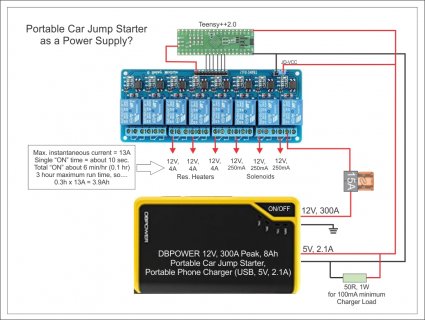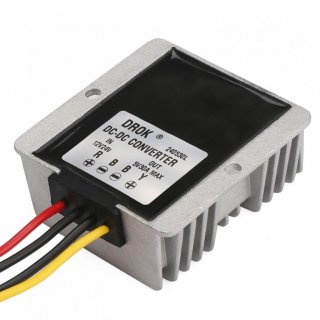Not being familiar with Portable Car Chargers, can I use one for this application (see attachment)?
I need both a compact 12VDC, 6-8Ah and a 5VDC, 2Ah power source for the attached circuit diagram. I saw this DBPOWER portable car charger.
https://www.amazon.com/gp/product/B07CVJV7KM/ref=oh_aui_detailpage_o00_s00?ie=UTF8&psc=1
It's small, has both voltage outputs from one package, and I can easily disconnect it for recharge (no special charger needed, just a standard 5V USB wall wart.)
Pros - low cost, single small package geometry fits available space, convenient connect/disconnect and recharge, plenty of capacity.
Cons - 5V charger port requires minimum maintained 100mA to stay "ON". 12V port is constant on and capable of 300A output if shorted.
To resolve "cons"...
A 50R resistor across the 5V output keeps the power on for the processor and relay modules. That only drains 100mA, so no problem for the planned three hour max. run time.
The 12V will be fused and switched, with max. draw of near 15A@12V. Total "ON" time at 15A about 0.3h per session....about 4.5Ah. So the 8Ah capacity is good.
Thanks for any advice.
I need both a compact 12VDC, 6-8Ah and a 5VDC, 2Ah power source for the attached circuit diagram. I saw this DBPOWER portable car charger.
https://www.amazon.com/gp/product/B07CVJV7KM/ref=oh_aui_detailpage_o00_s00?ie=UTF8&psc=1
It's small, has both voltage outputs from one package, and I can easily disconnect it for recharge (no special charger needed, just a standard 5V USB wall wart.)
Pros - low cost, single small package geometry fits available space, convenient connect/disconnect and recharge, plenty of capacity.
Cons - 5V charger port requires minimum maintained 100mA to stay "ON". 12V port is constant on and capable of 300A output if shorted.
To resolve "cons"...
A 50R resistor across the 5V output keeps the power on for the processor and relay modules. That only drains 100mA, so no problem for the planned three hour max. run time.
The 12V will be fused and switched, with max. draw of near 15A@12V. Total "ON" time at 15A about 0.3h per session....about 4.5Ah. So the 8Ah capacity is good.
Thanks for any advice.



